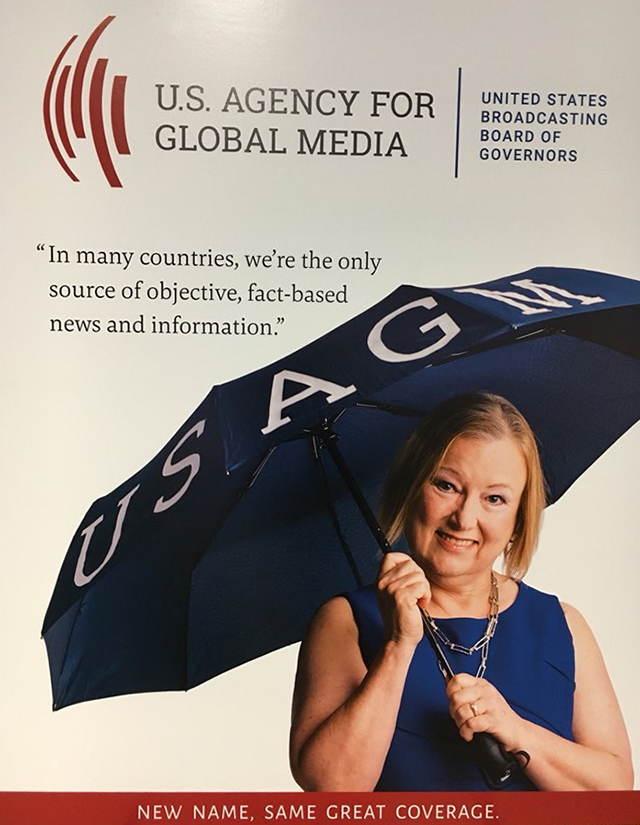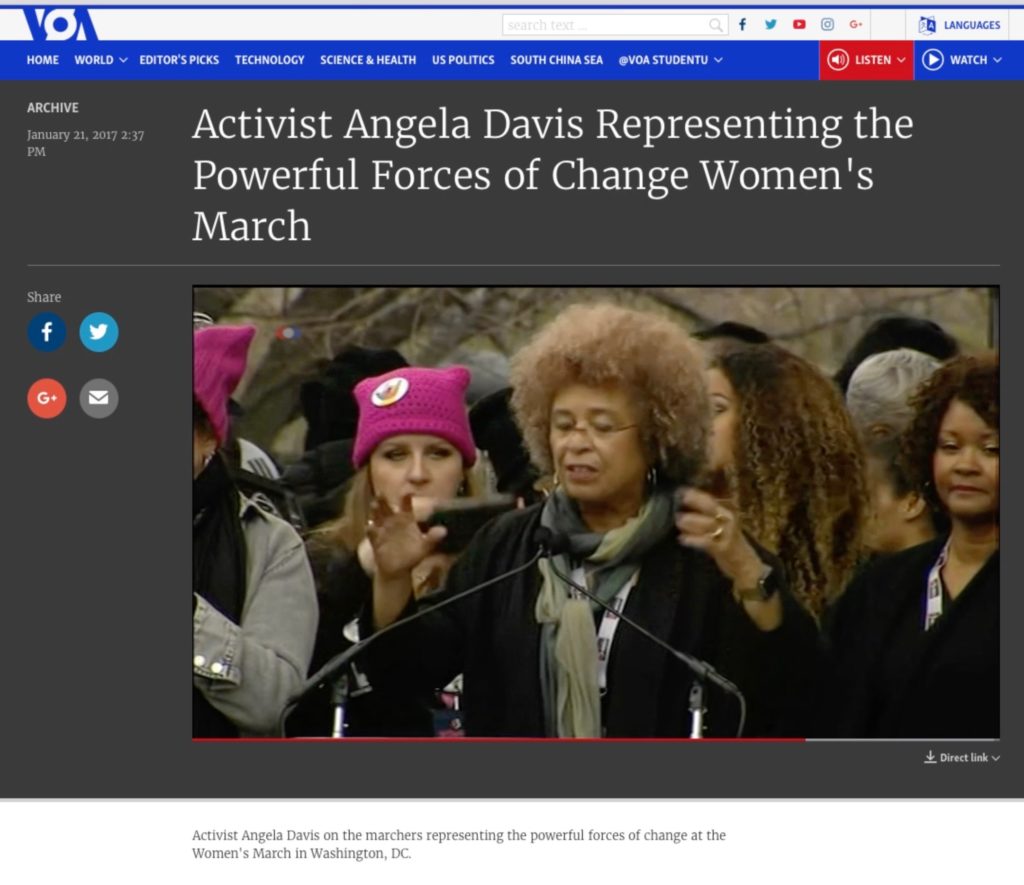OPINION



“U-SAG-M!” – United States Agency for Global Media
US Government International Media Information War Lost
By The Federalist
“Congress annually appropriates almost $750 million to the BBG. It’s time to get serious about reforming it to ensure a better return on that investment, or to try something else.”
– Thomas Hill*
For the article from which this quote is taken:
Allegations of ‘Trump TV’ distract from real issues at Broadcasting Board of Governors. By Thomas Hill, The Hill, August 20, 2018.
USAGM! United States Agency for Global Media!
A name tag that is pompous and overbearing as the day is long, desperately trying to be important and clearly not up to the boast, not before the name change and not now.
More than likely this isn’t the “something else” that Mr. Hill has in mind.
A name change for:
- The same dysfunctional agency.
- The same failed mission.
- The same lack of impact and effectiveness.
- The same oversized declarations, the hollow boasting when reality shows the agency as off the global media grid.
- A name change that is a bust with nothing of substance to show for it.
In typical fashion, a name with an acronym that doesn’t connect with its mission. And making the brag, failing to live up to the hype, the agency falls further into insignificance and irrelevance.
Where do we go from here?
Apparently, ever more in the gravitational pull of a downward spiral:
John Lansing, the hapless CEO of the agency can barely manage a couple dozen likes and about the same number of retweets from the agency’s press release announcing the name change.
Remember: 7-BILLION people on the planet and this is the best that John F. Lansing, BBG and now USAGM CEO Director can do.
Even if he had a thousand likes, multiplied ten times over, still barely a blip on the global media radar, the equivalent of insignificant ground clutter.
Motion Without Movement
The agency’s August 23, 2018 press release states,
“…the new name reflects our modernization and forward momentum while honoring our enduring mission to inform, engage and connect people around the world in support of freedom and democracy.””
Well, not so much.
Clearly the agency fails on all counts here. John Lansing and the rest of the agency’s mediocre bureaucracy, glad-handing and congratulating each other, are deep into deep denial ignoring the obvious with the rise of authoritarian regimes, successful anti-US propaganda campaigns and a significant decline in global free press.
Increasingly what the agency has is a disconnect with people around the world.
What the agency calls forward momentum is basically motion without movement. Worse, it continues to lose ground to traditional and non-traditional global media.
You cannot take Lansing or this agency seriously.
Even so, the agency has its die-hard true believers and sycophants, both inside and outside the Cohen Building.
From the outside, some are unhappy with the name change. One tweet reads,
“USAGM apparently stands for U.S Agency for Global Media. As brand names go, “U.S. Agency” is a real credibility buster for what should be a news organization.”
Really?
Here’s the truth of the matter:
Whatever the name, this agency has never been, is not now and never will be a “news organization.”
This is an information agency of the US Government. Thomas Hill, who was for a long time an observer of the Broadcasting Board of Governors while working on the Hill, knows this. Many better-informed individuals in Washington know this as well, but the writer of the tweet does not. Even though “information” has been dropped from the lexicon of official agency descriptives, this is what it is. Yes, news is part – but not the only part -of the agency’s mission. The Voice of America (VOA) in particular has two other equally important components to the charter which governs its operations…and which certain individuals within the agency and its newsroom try to avoid at all costs.
But the writer of the tweet insists on labeling the agency as something it is not.
And that’s where the credibility drain begins. And that drain started long before this incongruous name change took place.
The person who tweeted also doesn’t seem to understand that a sizable portion of global humanity knows that the agency with the Voice of America in it is part of the US Government!
Abroad, some try to tie this agency to the Central Intelligence Agency (CIA), which is false and somewhat laughable when you think about how the agency has bungled its way out and about in the 21st century. If the CIA were as inept and rife with incompetence as this agency is, the United States would be in some serious trouble. Fortunately, the only model this agency serves as is being the worst-managed agency in the Federal Government with the lowest employee morale as measured by the Federal Government itself in the anonymously conducted among Federal workers annual Federal Employee Viewpoint Surveys (FEVS).
Making the claim of being a “news organization” is even more comical: it is more than likely that commercial US news organizations (ABC, CBS, NBC, etc.) do NOT see the agency as a news organization. They see it as a US Government information agency.
In addition to not liking the name change, this same individual doesn’t like the positions staked out in Thomas Hill’s op-ed to The Hill publication.
For example,
“Washington experts want the BBG to be more coordinated with “U.S. security objectives?” But “to reach audiences with strategic messaging” is an oxymoron. Audiences are not seeking strategic messaging. Just report the news.”
“From what other outlet is news in *58* languages “readily available”? And because audiences for international broadcasting are seeking news that is more credible than what they get from state controlled domestic media, the “near-isolation” of the BBG is a good thing.”
Ah, the blissful fantasy world of this former agency cheerleader.
Here’s the reality:
Current and former agency bureaucrats have well-developed blind spots when it comes to the matter of both the short and the long strategic view. A large part of this is an overdose on arrogance.
Taking a different view:
You can be certain that the Russians have a strategic world view with regard to global publics and “news” as an integral part of that view. The extent of the Russian efforts to have influence in the 2016 US presidential election serves as a defining moment of their strategic vision in the area of global media.
We’ve said it before: the Russians are running their playbook.
This name change has no material counter-effect to the Russian playbook.
None.
Regardless of the arrogant blind-sidedness of agency officials past and current, the news is strategic messaging. The agency has to deliver on news that is reliable and accurate, particularly in strategic areas of the world like China, Iran, Russia, North Korea, etc.
To outward appearances it seems that agency content is not or cannot be seen, heard or read in anything remotely resembling significant audiences in strategic areas of the world.
The work produced by the agency is sloppy and slipshod in its online content, as recently exhibited in a posting referring to “Sonalia” in a news story.
In addition to the news, the other components to the VOA Charter deal with explaining the United States and not ceding that explanation to governments or individuals who have a decidedly anti-US viewpoint.
The same applies to explanations of US policy in order for global publics to best understand the United States from an authoritative source: namely, an agency of the US Government.
News as strategic messaging has been around for a long time, reporting and disseminating information like:
- The US Declaration of Independence from Great Britain.
- The American (and French) victory over Cornwallis at Yorktown.
- Napoleon’s defeat at Waterloo.
- Publishing the Emancipation Proclamation.
- The detonation of the first atomic bombs.
- The early Russian forays into space ahead of the United States.
It gets to be a lengthy list and our former bureaucratic hack can’t see the connection right in front of him.
What are we looking for?
The answer is impact and effectiveness. The agency must be an effective alternative to anti-US narratives and provide fact-based news.
The writer of the tweet goes on to believe, “the near isolation of the BBG is a good thing.”
Well, it’s not.
As the agency has demonstrated time and again, it is in the hands of effete ideologues who think they get to solely determine what the agency broadcasts be it news or other content. This puts the agency way out of step with its own Charter.
Absence of strategic thinking contributes to the agency’s dysfunction.
In the agency press release of August 23, 2018 Lansing speaks to a so-called “firewall” between it and the rest of government.
Memo to Lansing and Amanda Bennett (the VOA director):
There is no firewall.
The “firewall” is a fiction. It does not exist in the VOA Charter. It does not exist in any governing body of legislation. The concept of a “firewall” had a one-time, brief appearance in congressional conference language, but not in legislation. That was years ago, in the last century.
This is a new century. We are almost two decades into the 21st century. Certain realities have to be faced. Failures have to be acknowledged and remedial action taken.
In short, there has to be an integrated approach to delivering information to global publics by the US Government.
When you garner a reputation for being dysfunctional as this agency has, part of the remedial action required is close supervision. That has to be part of the equation since it is obvious the agency lacks a professional discipline or mission focus to do so.
Close supervision has to come from new leadership and new management. It may also have to come from a structural reorganization.
Integration with the rest of US Government is a survival issue for this agency. You can see it in the title, a comparable word play on the State Department “Office of Global Engagement.” The wording of Lansing’s memo is no accident. It is an obsequious attempt to garner favor and try to make the agency appear relevant.
These are desperate times for this agency. It has to attempt to demonstrate that it is up to the times. To date, including today, it has not. This may be one last attempt before, as Mr. Hill suggests, trying something else.
The safe money is to start looking for something else and to get on with it.
In a manner of speaking, this name change is nothing other than a game of smoke and mirrors. The underlying problems with this agency remain the same and are being compounded daily.
The Federalist
August 2018
*Thomas Hill is a visiting fellow at the Brookings Institution and an international affairs fellow at the Council on Foreign Relations. Previously, he served as a senior professional staff member for the majority staff of the House Committee on Foreign Affairs covering State Department operations. He also served for nearly 10 years at the Department of State, in both domestic and overseas assignments.
